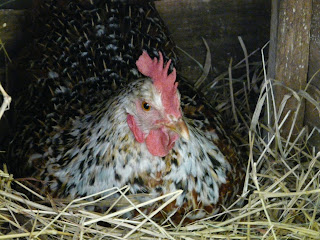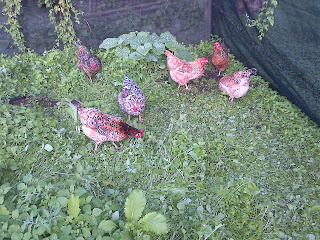How much emotion do animals really feel, in human terms? I have opinions within my own heart that fluctuate between thinking they feel emotion just as we do, and howbeit rarely, the other side of the spectrum - they feel nothing. That's when they act up, act stupid or show no mercy one to the other and I am angered into thinking they're hardly better than an inanimate thing and they 'feel' nothing. Perhaps it is because I care for animals that I want them to care too, and then disappointment pushes me to the other extreme. Neither opinion is completely true I'm sure but if chickens could be happy, mine would be. They have enough additional feed and a roof over their heads when they want to be dry and safe, they have nesting boxes full of grass...



... and they also have freedom between sunrise and sunset to scratch around out of doors. What more can a chicken ask for? The eggs are delicious with perky stand-up orange coloured yolks which attest to the fact that they always have fresh green stuff to eat. I have constructed numerous small camps around their nighttime bedroom and egg room, because I found the wide outdoors does not match up to their scratching ability. They turn it to desert in no time no matter how big it is. The smaller camps are opened up to them one by one to give the greens time to recover so they always have fresh greens to peck, and scratch in for grubs and insects.
Before the pigs came they also got all the excess greens and other vegetables from the kitchens and vegetable gardens. Now the other vegetables goes to the pigs but they still get lettuce, spinach, leek tops, citrus and capsicum all of which the pigs believe it or not, don't eat. And here I thought pigs eat everything.
The chickens are called Boschvelders, which is an African breed - go figure. They look like Nguni cows to me, in all their gloriously different colours. Someone should come and paint them.
There is something deeply satisfying about collecting the eggs in the afternoon, knowing that they are fresh, organically produced, and that the hens have not been tortured in the process.
I once bought hens that were reported to be better layers. When they arrived I was devastated to find their beaks had been cauterised (read burnt off so that they would not hook on the small aperture of wire frame through which they are supposed to eat). The bottom was longer than the top so I suppose what they actually do is scoop the food up. That was not the end of it. I shook out a bag of freshly-picked and then also finely chopped in consideration of the state of their beaks, greens next to them. They didn't know what it was, didn't even give it a second look.
Then I took laying mash and poured it into troughs about a meter away for them to eat, only to find they expected the food to come to them, they apparently didn't know they had to walk there. In the evening they still sat in the same place on the bare ground with the open door and perches just inside. I picked them up one by one, all 150 of them, and sat them down on the perches and they just kept falling off. Eventually they mostly slept on the floor, with just a few sitting on the lower perches.
I persevered. Hunger drove them outside and to the troughs first. It took about a week before they slowly started responding to the green stuff which we kept taking to them every day. They recovered. The beaks grew back some of the distance so they actually can peck again. They sleep on their perches and fly down like normal chickens in the morning and run between the open camp with greens and the troughs with laying mash, not wanting to miss out on anything.
As for being better layers, that part is not true. When they are treated like the Boschvelders (read not kept under lights 24/7 and fed incessantly and never exercised) the two breeds are on a par with each other. Except the 'fancy' variety's eggs were tiny for almost all of the first year.
FJ has been to egg producers and seen what the state is of chickens that have become commercially redundant, and especially how they are treated when they are taken out to be sold for slaughter. I shall say no more. He has seriously urged me never to set foot in such a place.
What we do to animals for production, high yields and money is disgusting.

































